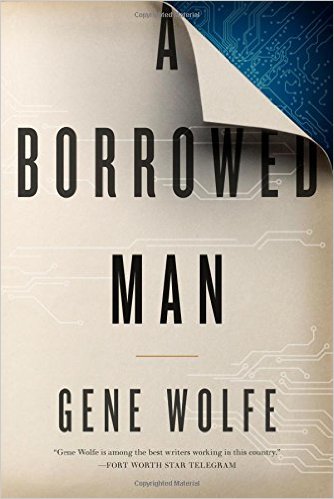 Gene Wolfe’s A Borrowed Man (Tor) is a novel that sneaks up on you.
Gene Wolfe’s A Borrowed Man (Tor) is a novel that sneaks up on you.
Beneath its cosy exterior, elegant origami-like folds of spare prose and apparently simple storyline, beats a very dark heart.
A hundred years in the future, when our civilisation is virtually gone, the recloned narrator, former author E.A.Smithe, is now nothing more than a library resource, to be borrowed like a book. Smithe, and others of his kind, live on the library shelves. The lives of the recloned are without meaning until they are checked out and used for their knowledge and skills by anyone with a library card who finds them of interest.
In A Borrowed Man, wealthy patron Colette Coldbrook takes Smithe from the library because he is the surviving personality of the author of a mystery novel called Murder on Mars. A physical copy of the book was in the possession of her murdered father, and it contains an important secret, the key to immense family wealth. Now it is lost and Colette is afraid of the police. She borrows Smithe to help her find the book and to find out what the secret is.
But when Colette suddenly disappears Smithe tries to find her but is in turn himself pursued.
The narrative style, from Smithe’s point of view, is formal, with echoes of noirish detective stories and films of the 1940s, complete with artificial-seeming dialogue. And Smithe’s lack of affect can be difficult to stick with, and is even downright annoying at times. Yet Wolfe is clever with Sithe’s personality (or lack of one), overturning reader expectations at every turn. For example, at one stage he violently beats up a man on a bus just for taking his seat. Completely out of the blue and seemingly also out of character – or is it?
Another problematic aspect of the narrative is the way Smithe objectifies Colette and other women. The salacious little details about Colette in a bra, and being in possession of nipple rings, feel gratuitous, although this may be quite deliberate on Wolfe’s part, and perhaps in keeping with the 1940s noir vibe of the story. But if he was trying to make an ironic or political point here, I missed it.
The many magician’s misdirections and narrative twists worked very well. A Philip K. Dick style paranoia leaks through the pores of the seemingly straightforward storytelling and often it’s impossible to trust what we’re reading. This was one of the most admirable aspects of the novel for me.
Near the end we have a huge exposition, explaining who did what to whom and why. In this respect it reads like an old-fashioned locked room mystery in which the detective reveals all in great detail.
By the time I reached the end of the novel, I felt torn about it. On the one hand I was reading the work of a master, whose earlier works I loved. Well written, certainly. A layered, sometimes rather hypnotic narrative, absolutely. In the end, though, it felt like it was a traditional science fiction/mystery/noir novel trying, but not really succeeding, to be a work of high literature.
But to return to my point at the beginning – this is a simple tale with a dark heart and twisty storylines. For those reasons alone, worth reading. At some point I may re-read it – something about it is challenging me to pick it up again, a rare enough occurrence for any novel…so maybe this, and other challenges of the novel are the whole point.

















Speak Your Mind